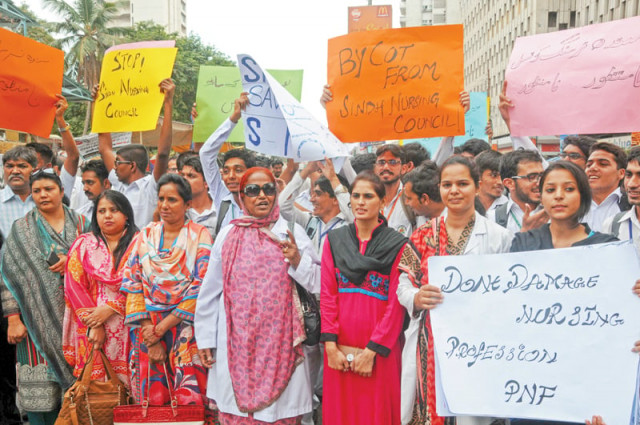Sindh Nursing Council Bill: Controversial legislation forces nurses to take to the streets
Claim the move is unconstitutional and undermines the profession

Sindh Nursing Council Bill: Controversial legislation forces nurses to take to the streets
Holding placards and banners, dozens of healthcare practitioners, adorned in their trademark white scrubs and uniforms, gathered to protest the new law at Karachi Press Club on Thursday on the joint call of the Pakistan Nurses Forum, Pakistan Nurses Federation and Nurses Christian Fellowship Pakistan.
The protesters were affiliated with Abbasi Shaheed Hospital, Jinnah Postgraduate and Medical Centre, Civil Hospital, Karachi, as well as various training institutions of the nursing profession. They shouted slogans against the 'Sindh Nursing Council Bill, 2014' that was approved by the Sindh Assembly on Wednesday with the stated aim to "provide and consolidate the laws relating to registration and training of nurses, midwives and health visitors".
Speaking to The Express Tribune, James Watt, the former Karachi president of the Pakistan Nurses Federation, slammed the bill as a recipe for disaster in the healthcare profession. "Certain individuals with vested interests want to create a provincial division between the healthcare practitioners, including nurses and midwives, in order to have a monopoly in medical education," said Watt. "We are foraying into a legislative chaos."
Sarfraz Asif, the president of Nurses Christian Fellowship Pakistan, added that the biggest disadvantage of this legislation to the nurses and midwives was that they will not be recognised in the other provinces or abroad.
"I have been to the United States and several countries in Europe where states and provinces enjoy utmost autonomy," said Asif. "These countries, however, keep their medicine and nursing regulatory bodies centralised to maintain uniformity in standards. What revolution do these politicians want to bring in Sindh when they have miserably failed to even maintain the standards of primary education?"
Wrong interpretation
The Sindh Nursing Council Bill claimed that the subject of health was devolved to the provinces in view of the 18th Amendment. "In order to regulate the matters relating to the nurses, midwives and health visitors, it is expedient to establish the Sindh Nursing Council at provincial level and enact a law," the bill states.
However, Advocate Saleem Michael, the chairperson of the Pakistan Nurses Forum, termed this stated premise completely out of place and an attempt to hoodwink the legislature and the public at large. "The Pakistan Nursing Council is an autonomous, federal regulatory body constituted under the Pakistan Nursing Council Act, 1952, and is empowered to register nurses, midwives, lady health visitors and nursing auxiliaries," explained Advocate Michael. "Under the same 18th Amendment, the status of the federal council is fully protected as it is a subject on the federal legislative list and it shall remain operative unless repealed in accordance with the Constitution."
Advocate Michael added that the Sindh Nursing Council Bill, in terms of language, construction and presentation, was virtually a copy of the federal law already in existence and passed by the National Assembly.
"The Sindh law department has submitted no documents to indicate that the due process of law has been followed, making this legislation completely unconstitutional," he said. "Neither was the Pakistan Nursing Council's Federal Act repealed or amended by the National Assembly, nor was the approval of the Council of Common Interests obtained to sanction this devolution."
Published in The Express Tribune, November 21st, 2014.


















COMMENTS
Comments are moderated and generally will be posted if they are on-topic and not abusive.
For more information, please see our Comments FAQ